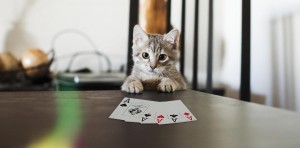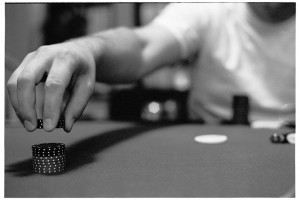Many people will argue that more than the gameplay of poker, the game’s distinguishing characteristic is its manner of betting.
Throughout the development of the game, betting received a good deal of attention in order to minimize confusion, create better security, and just generally make gameplay faster. There may be variations in rules and etiquettes from one playhouse to another but majority follows the standard rules.
The Procedure
First off, the players of a poker game are given turns following a clockwise rotation. The player must act only during his turn and should follow his first verbal declaration.
While no one bets yet, each player can “check”, meaning no bet placed, or “open”, meaning to place the first bet. After the opening, the choices for the players are:
- Fold – drop out of the round. The player is no longer eligible to win that round and loses any prior bets he made.
- Call – make a bet equal to the highest bet so far.
- Raise – make a higher bet than the highest so far.
Each act has rules surrounding it, which is depending on the agreement of the table. Aside from verbal declarations, players may just tap the table to indicate checking. Betting is done by simply sliding the chips in front but not directly to the pot, so everyone can confirm the amount placed in the bet.
Betting Order
In games, there are players that would be assigned as the big blind and small blind. This changes every round, usually via rotation. The one who acts first before dealing the flop is the person to the left of the big blind. After the flop is dealt, the first to act would be the person to the dealer’s left. Same is true after the turn and the river. A clockwise movement is observed and players who folded are skipped.
Proper Conduct in Games
Proper etiquette is observed especially in serious poker games involving big money.
Actions
In a round or hand, each player is responsible for keeping track of the actions of betting. This is so the player would know how much is needed to call and not disrupt the pace of the game. The dealer must especially keep track of the bet amounts at any given moment in the game to keep interruptions due to players forgetting the bet amount short.
To make tracking easy and confirm the bet amount, each player is required to stack the amount they bet for the ongoing round in front of them. Only when the betting round is over do they put the chips in the pot, or the dealer gathers the chips for them. “Splashing the pot” or the act of tossing chips directly into the pot can be an opportunity to put less amount than the declared. So, this is discouraged.
Players should also put the total amount of chips, the call plus any raise, at the same time. Placing the call amount first, then pausing before adding the raise amount is called a “string raise”. That pause is usually used to gauge reactions. Thus, this is also discouraged. Splashing the pot and string raises might even be outright prohibited in major casinos.
Only on Your Turn
To make an act out of a player’s own term is not in line with betting etiquette. Doing so creates confusion. For example, a player is still contemplating on a decision, but the player whose turn is after him already made a raise. The problem is that out-of-turn player already assumed the current player will note raise more than the amount he raised. If the current player does, the out-of-turn player needs to make a raise again. Thus, there would already be confusion in tracking the bet amount.
More importantly, out-of-turn acts give out critical information that would create unnecessary advantages or disadvantages to other players.
Cards
Each player is responsible for protecting their hole cards, i.e. to not let any other player know their values, even after folding. Doing so creates the same problem as acting out of turn. If you show your cards after you folded, the players would have an idea of the probability of what will happen, affecting gameplay.
In many poker games, players are required to keep their hole cards face-down on the table and just carefully peek when needed. This is because spectators may give away the hand’s strength whether intentionally or unintentionally. Players may also carelessly hold up their cards and a player may, intentionally or unintentionally, get a peek of them. Sometimes it may a direct look or through reflections, especially if the player is wearing eyeglasses.
Chips
In betting, there may be times when making a change out of the pot is needed. This is generally allowed, but with strict procedure. The objective is to avoid confusion.
The first thing a player needs to do is verbally announce his intentions. The player may then exchange a large value chip for equivalent value from the pot before he slides his bet. He may also place the chip and announce that he will be calling or raising less than the full amount and take the change from his own bet.
Making change is advised to be done outside a round, i.e. in between. This is to minimize confusion. In casinos, the dealer usually has a bank of low value chips to for players who need to change. In casual games, players may make changes with each other. The changing is best done in a preemptive manner, i.e. when a player is running low of a frequently used value. This is to avoid pace slowdown due to a player figuring out changes while a bet is ongoing.
Touching another player’s chips is a serious offense. You can be asked to leave a table or even get arrested if you do this in a casino.
Cash Usage
In casual poker games, players usually agree to allow betting in cash as it makes for a faster gameplay. But it is not secure since it can easily be removed from play. Casinos simply don’t allow this as it is a security risk.

